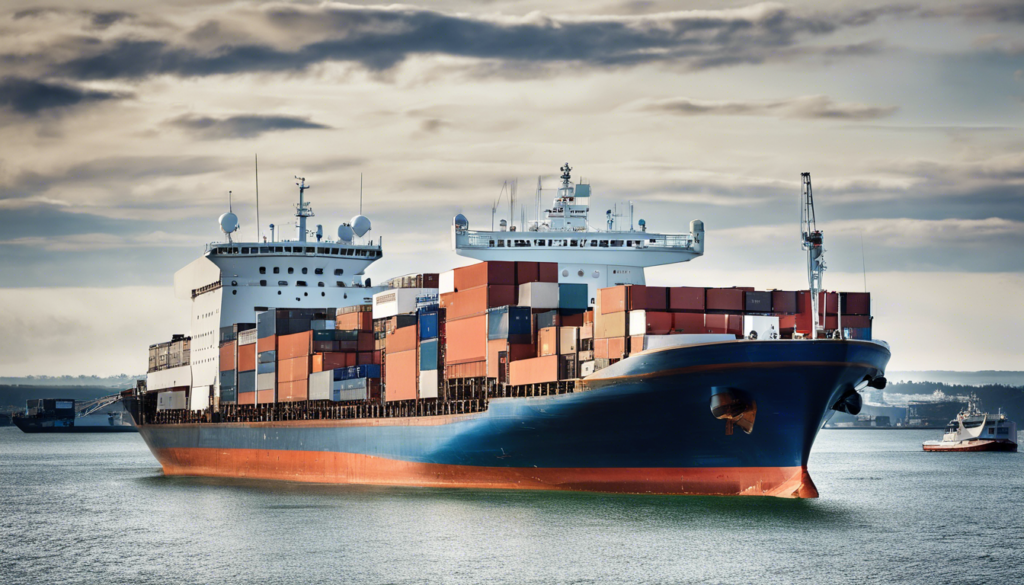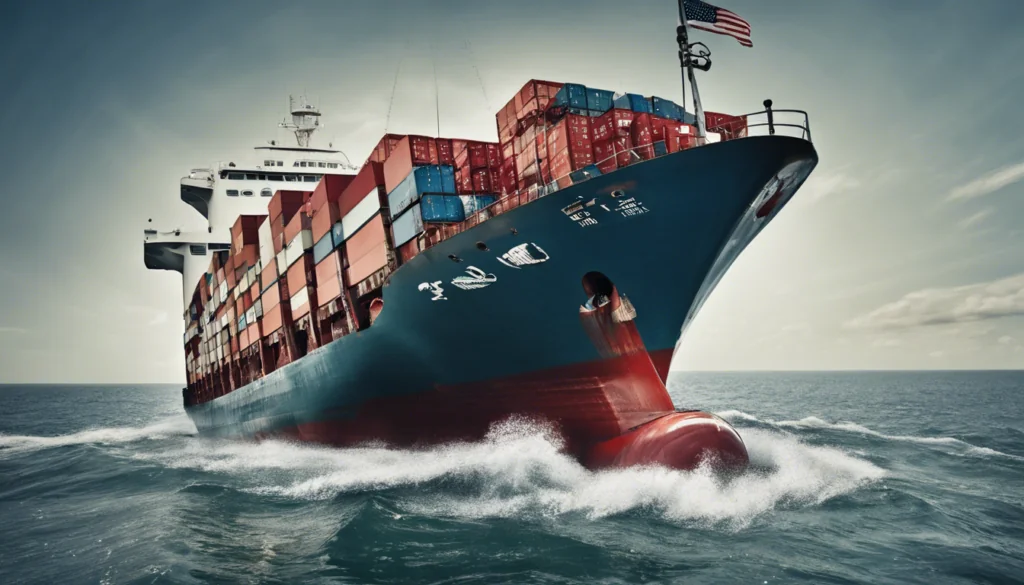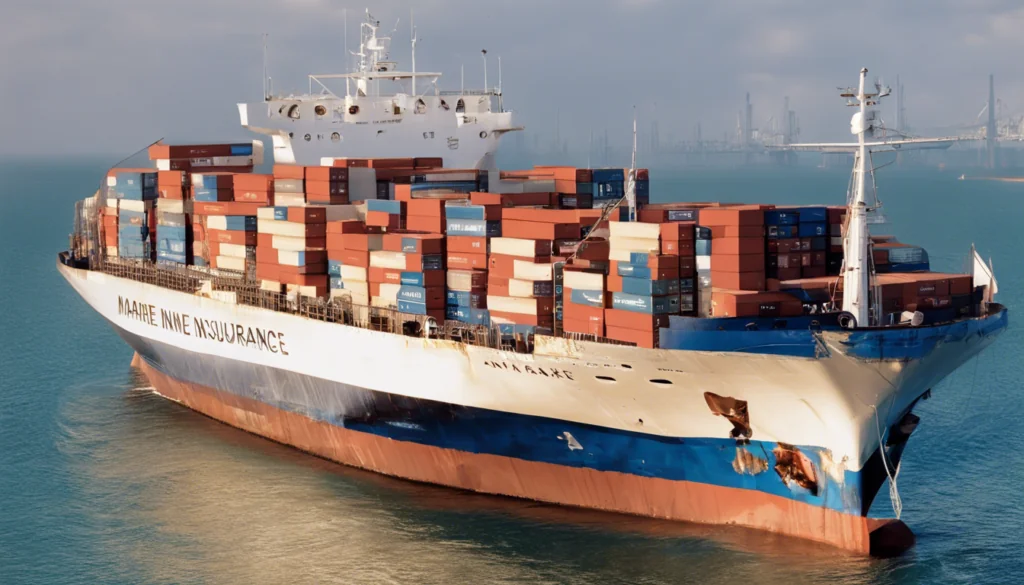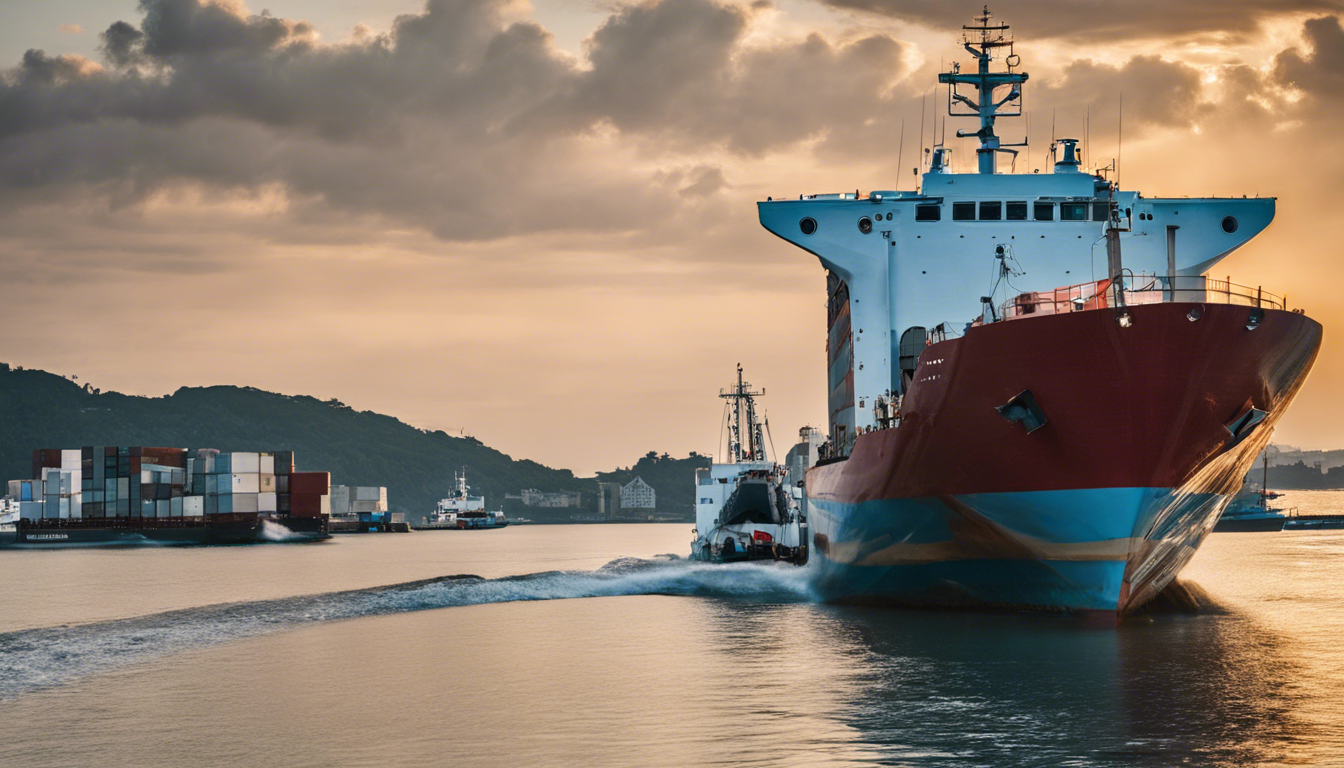Why Marine Insurance Matters
Marine insurance is an essential safeguard for the shipping industry, offering financial protection against the perils of the sea. It covers a range of potential risks, from damage to the vessel and cargo to liability issues arising from collisions or environmental harm.
With global trade heavily reliant on maritime transport, securing comprehensive marine coverage is not just a prudent decision but a critical component for the continuity of businesses involved in goods.
Marine insurance covers the risks and liabilities related to maritime transport. It is essential for companies and people concerned with maritime actions.

In this information, you may find out about:
- What marine insurance is
- The key sorts of marine insurance
- Who needs marine insurance?
- How marine insurance coverage works
- The benefits and challenges of marine insurance
- Important phrases and coverage options
What Marine Insurance Is:
Marine insurance provides specialized coverage for goods over water, safeguarding cargo, vessels, and related storage facilities from loss or damage during transit. Essential for businesses engaged in international trade, it helps minimize risks linked to sea voyages, including adverse weather conditions, piracy, and cross-border disputes.
Marine insurance provides coverage against damage or loss involving cargo, vessels, or any form of transportation used in maritime activities. As one of the oldest types of insurance, its roots trace back to ancient times when traders safeguarded their goods during perilous sea journeys. Modern marine insurance extends beyond protecting goods, offering a robust framework to mitigate diverse maritime risks.
Why Marine Insurance Is Important:
Marine insurance is crucial for safeguarding against the unpredictable nature of sea travel and trade. It provides a financial safety net for shipowners, cargo owners, and transport operators, ensuring that in the event of a mishap such as a shipwreck, piracy, or cargo damage.
Furthermore, with the expansion of international trade and the increasing value of goods transported across the oceans, marine insurance has become an indispensable tool for businesses to manage the risks associated with global commerce.
Marine insurance coverage is essential for worldwide commerce corporations’ property from unexpected dangers. The foremost sorts of marine insurance coverage embrace:
- Hull Insurance: Covers physical damage to the ship or vessel.
- Cargo Insurance: Protects the cargo throughout transportation, masking harm, loss, or theft.
Liability Insurance: Shields the shipping company or the shipowner against legal liabilities arising from collisions or environmental damage caused by the vessel. This type of insurance is crucial for mitigating the financial risks associated with potential lawsuits or fines.
Protection and Indemnity (P&I) Clubs often provide this coverage, offering a range of services including legal assistance, claim handling, and indemnification for various maritime liabilities. Both delivery corporations and people should purchase marine insurance to safeguard their investments.
Types of Marine Insurance:
Marine insurance policies fluctuate to meet particular maritime needs:
Cargo Insurance: This form of marine insurance is crucial for businesses involved in transporting goods by sea. It covers the loss or damage of cargo due to perils of the sea, such as storms, sinking, and collisions.
Cargo insurance policies can be tailored to the value of the goods and the specific risks involved, giving shippers peace of mind that their financial interests are protected throughout the voyage. Ensures delivery prices are lined even when cargo is misplaced or broken.
Cargo Insurance:
Protects items throughout transport.
Covers theft, loss, and harm throughout loading and unloading.
Applies to sea and air freight.
Can be tailor-made to particular shipments.
Hull Insurance:
Covers harm to the ship itself.
Includes accidental damage, collisions, and grounding.
Frequently consists of coverage for gear breakdowns.
Liability Insurance:
Covers monetary liabilities from accidents or damage to third parties.
Includes private harm claims, air pollution liabilities, and harm to different ships or property.
Essential for operators in high-risk areas.
Freight Insurance:
Protects freight forwarders or logistics providers from financial losses.

Key Features of Marine Insurance:
- Freight Insurance: Cargo Insurance: Covers the loss or damage of goods in transit, whether by sea, land, or air. Essential for businesses that transport goods regularly, to ensure they are protected against unforeseen events such as theft, loss, or damage.
- Cargo insurance offers reassurance to both shippers and receivers by reducing financial risks. It compensates for the value of freight in cases of loss or damage. This coverage is crucial for logistics companies and freight forwarders, ensuring comprehensive protection when paired with cargo insurance.
Protection and Indemnity (P&I) Insurance
Protection and Indemnity (P&I) Insurance offers a different layer of security, particularly for shipowners and operators. It covers liabilities such as third-party and environmental damage that may not be included in standard hull and machinery policies.
This insurance helps manage legal and financial risks in maritime operations, giving businesses confidence to handle liabilities.
P&I insurance coverage is specialized liability insurance coverage for ship homeowners. It covers dangers not included in normal hull or cargo insurance policies, equivalent to private harm to crew members, stowaways, and air pollution liabilities.
Key Features:
- Covers liabilities not addressed by traditional marine insurance.
- Includes authorized charges, environmental harm, and private harm.
- Typically utilized by giant delivery corporations and operators.
Marine insurance is essential for maritime industry participants, from shipping companies to vessel owners, charterers, and cargo owners. It provides a safety net that mitigates the financial risk associated with the unpredictable nature of marine operations.
Marine insurance provides vital protection, whether safeguarding against cargo loss from a shipwreck or covering environmental cleanup costs after an oil spill. In a high-stakes industry as expansive as the oceans, it offers invaluable peace of mind. Essential for those involved in maritime transport, shipping, or trade, here are the key beneficiaries:
- Shipping corporations: Shipping corporations, with their massive fleets and valuable cargo, rely on marine insurance to mitigate financial risks associated with accidents, piracy, and cargo damage. This form of insurance is not just a safeguard but a strategic necessity, it allows these corporations to operate in international waters.
- Without it, the financial burden of a single mishap could be catastrophic, potentially disrupting global supply chains and causing economic ripples across various industries. Protect their vessels and cargo from unpredictable maritime circumstances, offering financial security and peace of mind.
- Importers and exporters: Importers and exporters rely on AI-driven personalization to enhance their logistics and manage risks. By harnessing the power of machine learning and predictive analytics, they can anticipate potential delays, adjust routes in real time, and even identify the most cost-effective shipping methods.
- This advanced customization optimizes the supply chain, delivering a significant competitive advantage by ensuring products reach the market swiftly and dependably. It also protects items during global transportation. Securing cargo insurance offers recovery for losses in case of damage or loss. Replace selected block text
- Freight forwarders and logistics suppliers: Freight forwarders and logistics providers are increasingly adopting AI to enhance the efficiency of their operations, offering clients enhanced tracking and predictive analytics for their shipments.
- By integrating AI-driven tools, these companies can anticipate delays, reroute shipments in real-time, and provide customers with accurate, up-to-the-minute information about their cargo.
- This enhances customer satisfaction and streamlines the shipping process, reducing wasted time and resources while boosting overall efficiency.. Guarantee a secure supply of products and protect against financial loss from unforeseen delivery incidents.
- Ship Owners: In the highly competitive shipping industry, AI personalization extends beyond operational efficiencies to enhance customer relationships. By analyzing past interactions and preferences, AI systems can tailor communication and service options to individual clients, fostering a sense of loyalty and trust.
- This level of customization ensures that ship owners can offer unique solutions that resonate with their customer’s specific needs, setting them apart from competitors who may still rely on one-size-fits-all approaches.
- Vessel owners need hull insurance coverage to protect their ships, whether they own a private yacht or a business vessel, to prevent significant financial losses from damage.
- Fishing Industry Operators: Marine transport companies: Need customized insurance plans to address the distinct challenges of transporting goods across global waters. AI-driven personalization enables real-time risk evaluation, factoring in weather conditions, geopolitical risks, and piracy concerns.
- Harnessing big data and predictive analytics, insurers can provide tailored coverage that aligns with the unique needs of marine transport companies while proactively addressing potential challenges during their journeys. Ensure insurance coverage for vessels, equipment, and catches used in commercial or recreational fishing.
Marine Insurance Coverage: What’s Included and Excluded
Navigating the complex waters of marine insurance requires a thorough understanding of what is typically included in a policy, and what is left out. Generally, marine insurance coverage extends to damage or loss of the vessel and its onboard equipment, liability for bodily injury or damage to other vessels, and sometimes pollution liability if the ship is involved in an oil spill.
However, exclusions often apply to wear and tear, willful misconduct by the shipowner, and damage from war or nuclear risks, underscoring the importance of carefully reviewing a policy’s terms and conditions. Knowing what marine insurance covers—and what it doesn’t—is key to ensuring proper protection.
What’s Covered:
- Hull insurance is a crucial component of marine insurance that offers protection against physical damage to the ship itself. This coverage includes protection against risks such as collisions, fires, and natural disasters like storms or hurricanes that could jeopardize the vessel’s integrity.
- Additionally, it frequently encompasses salvage operations and essential towing services, providing financial protection for shipowners in the face of unexpected maritime incidents. This includes coverage for vessel damage, freight loss, cargo harm, and legal liabilities.
What’s Excluded:
- Shipowners must understand that while marine insurance provides extensive coverage, it does not offer blanket protection against all eventualities. Typical exclusions from such policies include willful misconduct by the shipowner, wear and tear of the vessel, and damage from war or nuclear risks.
- Furthermore, losses incurred due to insolvency or financial default of the charterer are also generally not covered under standard marine insurance policies. Conventional marine insurance coverage usually doesn’t cover harm from conflict, operator error, regular wear and tear, or illicit exercise.
Marine Insurance Costs: Factors Affecting Premiums

Factors Affecting Marine Insurance Premiums
When determining the cost of marine insurance premiums, insurers take into account a myriad of factors. The value of the ship and its cargo, the vessel’s age, type, and condition, as well as the experience and track record of the crew, are all critical considerations.
Additionally, the routes taken and the potential hazards associated with certain waters or ports can significantly influence the level of risk perceived by insurers, thus impacting the premium.
Environmental factors such as weather patterns and political stability in the regions of operation also play a pivotal role in the cost calculation. Several elements decide the price of marine insurance premiums. Understanding these elements helps companies and people choose the appropriate coverage at a reasonably priced value.
Deductibles: Deductibles play a vital role in marine insurance policies, representing the out-of-pocket amount the policyholder must pay before coverage begins. Generally, opting for a higher deductible results in lower premiums, as the insured takes on greater risk.
It’s essential for policyholders to carefully consider their deductible amount, balancing their ability to pay this cost in the event of a claim against their desire for a lower annual insurance expense. Higher deductibles can decrease premium prices but imply extra out-of-pocket bills if a claim is made.
Cargo Value: Accurately determining the value of transported goods is essential for policyholders. Underestimating the cargo’s worth may result in inadequate coverage, exposing them to potential financial risks in case of loss or damage. On the other hand, overestimating the value can lead to inflated premiums, increasing costs unnecessarily.
Partnering with an experienced insurance agent can help you assess the right level of coverage tailored to the cargo’s value and the unique risks involved in its transportation. Premiums typically increase with the cargo’s worth. High-value items such as electronics or luxury goods often demand specialized comprehensive coverage.
Type of Vessel: Type of Cargo: The nature of the goods being transported also plays a critical role in determining the insurance needs. Perishable goods, such as food items or flowers, may need additional coverage for spoilage or temperature control failure, and hazardous materials might necessitate extra insurance due to the increased risk of accidents or contamination.
Similarly, bulky or heavy items could increase the risk of damage during loading and unloading, requiring more robust insurance protection to cover potential losses. The sort and measurement of the vessel affect the fee. Larger and more complex ships generally need more expensive hull insurance.
Geographical Route: Navigational risks associated with specific geographical routes can significantly influence hull insurance costs. For instance, routes that pass through areas with higher instances of piracy, political instability, or natural hazards such as icebergs or hurricanes may necessitate higher premiums due to the elevated risk of damage or loss.
By analyzing vast datasets that include historical incident reports, weather patterns, and political climate data, AI systems can predict the likelihood of future perils with remarkable accuracy.
This enables insurers to tailor premiums more precisely for each vessel’s specific route, ensuring that ship owners are not overpaying for coverage while still being protected against potential threats. Insurance providers must carefully assess these factors when calculating rates, ensuring that coverage is adequate for the anticipated perils of the journey.

